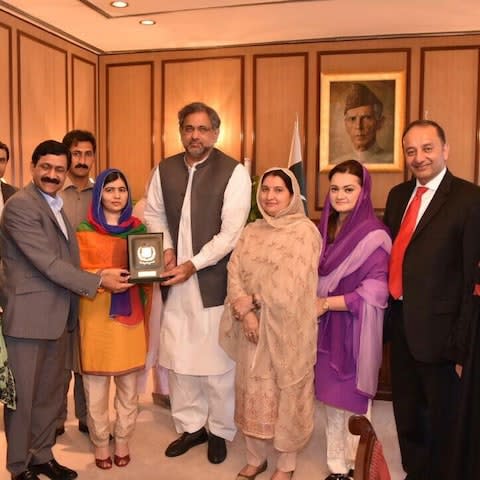Malala Yousafzai returns to Pakistan in 'dream' trip to push education for girls

Almost six years after being shot in the head just for going to school in Pakistan, Malala Yousufzai has returned to her homeland to launch a series of education projects for girls.
Yousafzai said her trip to Pakistan - her first since she was airlifted to the UK for treatment after being shot by a Taliban gunman in 2012 - was a "dream".
The campaigner was visibly emotional as she gave a short speech about returning home for the trip, and about her passion for empowering women and girls, after a meeting with Pakistan's Prime Minister Shahid Khaqan Abbasi in Islamabad.
"For the last five years I dreamed that I can set foot in my country," she said, wiping away tears.
"It's the happiest day of my life. I still can't believe it's happening," added Yousafzai, clad in a traditional shalwar khameez outfit with her head covered with a red and blue duppata scarf.
While details about her trip are being closely guarded for security reasons, and it is unclear whether she will visit the Swat valley, where the attack in 2012 took place, Yousafzai is expected to use the trip to launch a number of educational intiatives, institutions and scholarships under her foundation, the Malala Fund.

The 20-year-old, now a student at Oxford University in the UK, said: "We need to invest in kids' education. I hope we can all join hands in this mission for the betterment of Pakistan, so that our future generation can receive the right education and women can become empowered, do jobs, stand on their own two feet and earn for themselves.
"That's the future we want to see."
Yousafzai won the Nobel Peace Prize in 2014, aged just 17, becoming the youngest ever recipient of the prize for her education advocacy. She has already used some of her prize money to open a school in Shangla, near her home town of Swat, earlier this month, but her new initiatives are expected to be more wide-ranging.
Renowned women's rights activist and friend of Malala's family, Shawana Shah, told The Telegraph that the purpose of the visit was to launch some projects aimed particularly at supporting female students in the remote Khyber-Pakhtunkhwa region of Pakistan where Malala grew up.
Malala Yousafzai in quotes
It is understood that the Malala Fund will collaborate with the Benazir Income Support Programme, a scheme set up to fight poverty in Pakistan in the name of assasinated ex-Prime Minister, Benazir Bhutto, in its work.
Shah said the Malala Fund will provide funding for female students in remote areas, where different education institutes and scholarships will be announced. Full details on the collaboration will be ironed out and more announced during Yousafzai's four-day visit, Shah added, and the collaboration could add up to billions of dollars.
Official sources told the Telegraph that Prime Minister Abbasi had assured Malala of his full support in connection with the educational projects she wanted to set up.
"You were a 13-year-old girl when you left and now you are the most famous citizen of your country," he said to Malala in front of TV cameras at his office. "Welcome home, Malala."
Ms Yousafzai became a global symbol for human rights and a vocal campaigner for girls' education after a Taliban gunman boarded her school bus in the Swat valley on October 9, 2012, asked "Who is Malala?" and shot her.
She was treated for her injuries in the British city of Birmingham, where she completed her schooling and resumed campaigning.
Malala, who travelled back to Pakistan accompanied by her father and brother, said that if it had been up to her, she would never have left Pakistan.
"I don't normally cry ... I'm still 20 years old but I've seen so many things in life," she said.
Pakistan’s daughter and the global symbol of female education is back in Pakistan. Welcome home @Malala. pic.twitter.com/2hjphMtZsJ
— Umar Saif (@umarsaif) March 29, 2018

